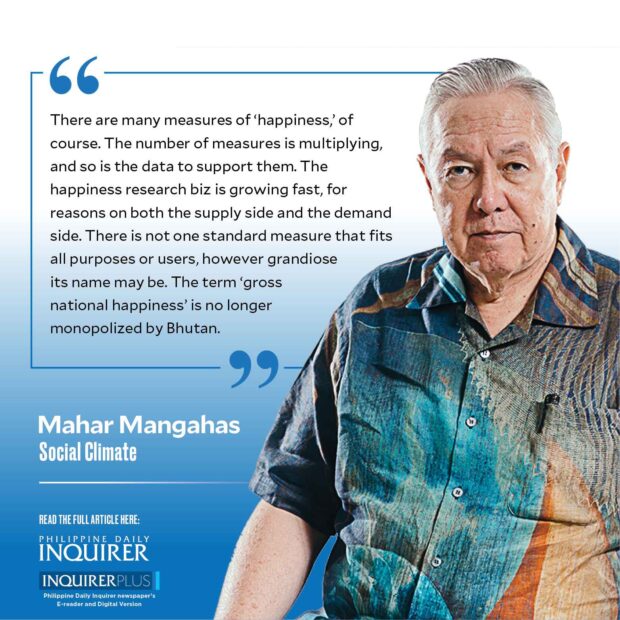Letter from Rotterdam
SCHIEDAM, The Netherlands — This small city, beside Rotterdam, is the venue of the Aug. 21-25, 2023 conference of the International Society for Quality of Life Studies. Isqols, established in 1995, is the world’s leading association of researchers into happiness and well-being; it presently has 442 active members from 59 countries; its journal is Applied Research in Quality of Life.
Attending the conference are some 300 members and 100 nonmembers. There are six Filipinos here, including three from Social Weather Stations (SWS) and two from the University of the Philippines. SWS is well-known, having received the 2019 Isqols Award for the Betterment of the Human Condition (awarded previously to the United Nations Development Program for its Human Development Index and to Transparency International for its Corruption Perceptions Index). Being retired, my own costs here are not borne by SWS, but (partially) by the National Academy of Science and Technology.
Article continues after this advertisementWe’re here to learn, not how to better our personal well-being, but how to improve our research on the well-being of others. My SWS colleagues presented survey findings on (a) happiness derived from love-life, and (b) the suffering and anxieties experienced during the COVID-19 lockdowns.
Rotterdam is a very fitting conference venue, since the World Database of Happiness is based in the Happiness Economics Research Organization (EHERO) of Erasmus University Rotterdam. This database is directed by its founder, Ruut Veenhoven, who has been dubbed “the Pope of Happiness.” Ruut’s favorite happiness indicator is the expected number of healthy-life years.
The EHERO academic director, Martijn Burger, also happens to be the current Isqols president. (Seeing a reference to him as “chief happiness officer,” I asked Martijn for his job description. He said the title is bothersome, since it makes the staff think he is responsible for their happiness; rather, each is responsible for her/his own happiness.)
Article continues after this advertisementThere are many measures of “happiness,” of course. The number of measures is multiplying, and so is the data to support them. The happiness research biz is growing fast, for reasons on both the supply side and the demand side.
There is not one standard measure that fits all purposes or users, however grandiose its name may be. The term “gross national happiness” is no longer monopolized by Bhutan. Users should understand the ingredients of the various measures before selecting any or designing new ones themselves. Certainly, the one thing common to them is the acceptance of the concept of subjective well-being (SWB).
The World Happiness Report, for instance, is published by the private group Sustainable Development Solutions Network, using Gallup World Poll data. Its measure of SWB uses an 11-point ladder scale, of the integers from 0 to 10, where 0 stands for the worst possible life and 10 stands for the best possible life that people can imagine. This is the scale where Finland has been a regular “winner” for the past few years, with an average score close to 8.
On the other hand, consider an alternative 11-point scale, of the integers -5, -4, -3, -2, -1, 0, 1, 2, 3, 4, 5, where -5 stands for the worst two-week-experience and 5 stands for the best two-week-experience that people remember happening to them personally t. Survey respondents are then asked to rate their most recent two weeks using this scale ranging between their personal worst and their personal best.
This measure is called Anamnestic Comparative Self-Assessment (Acsa) — ”amnestic” means “forgotten,” while “anamnestic” means “remembered.” It was devised by Jan Bernheim, a Belgian oncologist, who used it to guide his treatment of cancer patients. It’s amazing that the mind might forget, but the body can remember.
Dr. Bernheim presented the Acsa concept at the Isqols conference of 2017, and found interest from Germany, the Philippines, South Africa, and elsewhere. Acsa has now been tested in six SWS national surveys since 2017 (“Third Quarter 2022 Social Weather Survey: Anamnestic Comparative Self-Assessment (Acsa) at 2.39 in October 2022, a continuing recovery from the record-low 1.97 in May 2021,” www.sws.org.ph, 8/9/23). The movements of Acsa in the Philippines in the last few years have been consistent with those of poverty and hunger. The recovery to pre-pandemic 2019 has continued, but is not complete.
On to the 2024 Isqols conference, set for Kota Kinabalu, Malaysia!

















